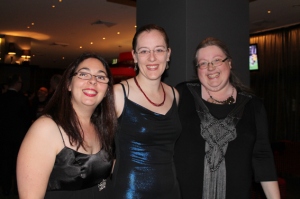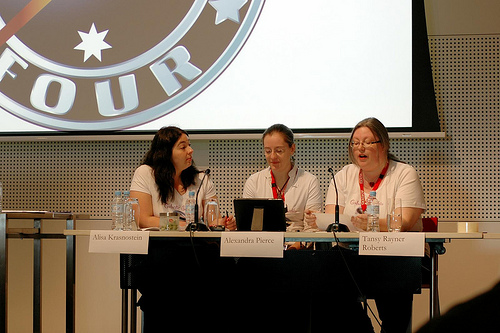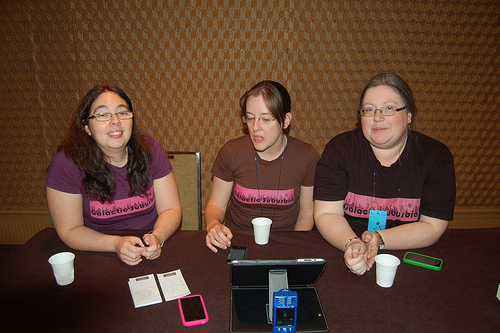I have been featuring fantastic female fantasy authors (see disclaimer) but this has morphed into interesting people in the speculative fiction world. Today I’ve invited the talented Kirstyn McDermott to drop by because her new book, Perfections, has just come out. Congratulations!
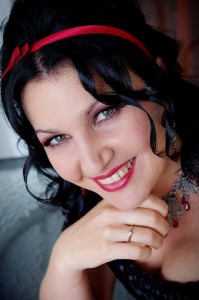 Q: Okay, first the really important question, your twitter handle is @fearofemeralds. Why?
Q: Okay, first the really important question, your twitter handle is @fearofemeralds. Why?
That question has a simple answer, but I’m afraid that I’m going to skirt around it anyway. Essentially, the phrase is part of a larger sentence that I took with me from a dream a long, long time ago. I seldom remember my dreams upon waking, but this one was vivid and had a lot of impact on me at a time when I was agonising about whether or not I had any talent as a writer at all, and whether or not I should even bother attempting a career in that field. The whole sentence now has such talismanic properties for me that I had it tattooed in mirror writing across my ribs a couple of years ago, as a permanent reminder to keep going no matter what. My earlier use of “fearofemeralds” first as an LJ name and then as a twitter handle had a similar motive, making sure it was front and centre on a regular basis. I probably don’t need that anymore, now I have the tattoo, but it’s a little late to go changing things. And no, sorry, I’m not going to reveal any more particulars of the dream or even tell you the whole sentence – which I know is a dreadful tease, but the superstitious part of me believes that the talisman will be robbed of any power if shown to the world. 🙂
Q: In an interview with Lisa Hannet when talking about the horror genre you say: ‘I find myself fascinated by the monstrous– which really boils down to being anything we’re told “normal” people shouldn’t look at or think about or discuss in polite company. Taboo topics. Fringe dwellers. The black in black-and-white. I don’t believe in Evil as a manifest force. I do believe that humans are capable of doing evil things, and that a great number of humans acting in concert are capable of great evil indeed, but what interests me are the underlying reasons, motivations and causes. What makes a human being – someone similar to myself, perhaps – able to commit certain acts that I would find abhorrent, or allow others to commit them? I deeply, deeply want to understand this.’ Do you see horror as a way of making sense of the world? Do you think people who write and read horror are more troubled by the darkness both around and inside us?
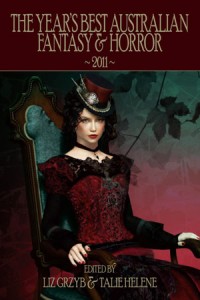 I think one of the driving forces behind humans creating and partaking in art generally is an attempt to make sense of the world, and to connect with others in this endeavour, and horror fiction is certainly no different. That’s not to say that it’s the only motivator, but it is an important one, at least to me. It influences what I write and it certainly influences the types of books I like to read. I want books that make me think, that invite me to view the world differently and reconsider my preconceptions – and that are very well crafted to boot. I’ve become a highly critical reader over the past decade or so and find myself having less and less patience for fiction – horror or otherwise – that feels like it’s playing by the numbers, or is taking too many shortcuts with well-worn tropes or lazy writing.
I think one of the driving forces behind humans creating and partaking in art generally is an attempt to make sense of the world, and to connect with others in this endeavour, and horror fiction is certainly no different. That’s not to say that it’s the only motivator, but it is an important one, at least to me. It influences what I write and it certainly influences the types of books I like to read. I want books that make me think, that invite me to view the world differently and reconsider my preconceptions – and that are very well crafted to boot. I’ve become a highly critical reader over the past decade or so and find myself having less and less patience for fiction – horror or otherwise – that feels like it’s playing by the numbers, or is taking too many shortcuts with well-worn tropes or lazy writing.
As to the second part of your question, I don’t that “more troubled by the darkness” is necessarily true. I think we’re genuinely more fascinated by it and more inclined to dig down into the guts of it to see what makes it work, and we might even become a touch inured to some of the horrible stuff we see on the page and the screen – though not, I strongly believe, to real life horrors. But this doesn’t mean that people who don’t read/write horror are any less troubled by the bad stuff; they simply don’t wish to dwell on it when it comes to their culture or entertainment. Which is a fair enough call. Hell, I don’t partake in the romance genre to any sort of measurable extent; it simply fails to ring my bell and always has. But I don’t think that means I am in less capable of experiencing and enjoying love and romance in real life than a hardcore romance reader (or writer). Or that readers/writers of romance are somehow “lesser” than those who like horror. It pays to remember that dark doesn’t automatically translate to deep.
In my more belligerent early twenties, I did share what was relatively common attitude within the horror community, that people who refused to read horror were little more than ostriches with their heads in the sand when it came to The Truth About Life. But isn’t that kind of extremist philosophy what your early twenties are all about? Really, life and people are a lot more complicated than that. My tolerance for those who look down their nose at the genre per sae, or decide that horror readers/writers must be somehow sick or dangerous, however, remains at a critically low threshold. Because dark doesn’t automatically translate to damaged, either.

Q: Since 2010, you and Ian Mond have been hosting a monthly podcast ‘devoted mostly to speculative fiction books, reviews and the odd bit of idle gossip’. The Writer and Critic won the Ditmar and Chronos Award this year. Did you have a ‘mission statement’ when you were first putting together the podcasts? What did you want to achieve with them?
Ian’s initial mission statement was something like, “Hey, podcasts are cool. Let’s do a podcast.” He came up with the idea and beat me over the head with it for a few months until I relented and we nutted out the format. We still don’t have a real mission statement, and have tweaked the structure a number of times with varying results. What we have decided is that we will only feature two books per episode from now on, as having a third title every so often when we had a guest on was really stretching our collective stamina – not to mention the recording time!
Our initial idea was to create a podcast where we could review books at length. We both really enjoy discussing interesting books that we’ve read, and sometimes pulling apart more problematic works, but finding the time to put thoughts down on the page is difficult. There’s no way I would ever be able to write the sort of in-depth critiques of books that I can have in conversation with Ian over the course of a couple of hours. Because we were coming at it from a book review standpoint, we avoided spoilers in the first couple of episodes. But this constrained discussion to a significant extent and, at the urging of a couple of our listeners, we abandoned that strategy and switched to more of a “book group” type discussion, assuming that people had already read the books, or did not care to have major plot points and even endings spoiled. It makes for a more natural conversation, I have to say, when you’re not busy worrying about whether or not the point you’d like to make will result in a spoiler.
I don’t know that we set out to achieve any more than that, to be honest. Two friends, both avid readers, recommending books to each other and then putting aside one evening a month sit around and chat about them. So I’m genuinely flattered, and quite honoured, to think that people enjoy listening in on these discussions enough to consider the podcast award-worthy!
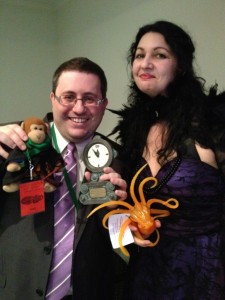
Q: Do you and Ian get together and brain-storm goals for The Writer and Critic? If so, where would you like to take this podcast in future?
We don’t really brainstorm as such. More like, one of us will get an idea for something and email the other one, and they might say, “cool” or “meh” or “don’t be an idiot”, as the suggestion warrants. We’re still proceeding in more of a fluid/organic manner, rather than having any grand plans for the future. (Apart from reaching 100 episodes – I know Ian is very keen to get that far!)
What I am interested in doing is working out a way to bounce more ideas off listeners, and incorporate their suggestions – whether these are actual book recommendations, or structural ideas. It’s been great having Ian, and our guests, influence my reading in such a direct way over the past couple of years. I’ve read and enjoyed books I probably would never have thought to even pick up on my own. On the flipside, I’ve occasionally had to finish a book I might otherwise have flung against the wall, but this is a valuable experience in itself. Not only having to finish it, but to analyse precisely what it was I didn’t like in order to be able to talk about it for half an hour – this hones the critical skills immeasurably.
I’d also like to hit the road with a travelling podcast at some point, if Ian and I can work out the logistics. We always like to record in person, rather than resort to Skype or similar remote technology, so that does limit the guests we can have on to those in close geographical proximity. I’m pushing for a Grand Tasmanian W&C Tour, but still need to convince Ian. Mind you, I’m sure his wonderful wife would love a Tassie holiday …
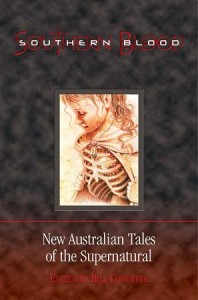
Q: Your first short story was published in 1993. In 2003 your short story The Truth About Pug Roberts was nominated for a Ditmar and your story, Painless, won an Aurealis Award in 2008. (For a full list of Kirstyn’s fiction see here). This helped to establish your reputation as a writer. Did you find the publications and award wins helped you sell your first book? And do you recommend aspiring writers polish their writing craft with short fiction before jumping into novels?
I’m not sure how much the awards mattered – although they mattered a hell of a lot to me! – but having short fiction published definitely helped sell my first novel. My soon-to-be publisher actually tracked me down and sent an email asking to see my manuscript after having read a couple of my stories in literary journals. The novel, of course, then had to sell itself but the short fiction is how I was noticed in the first place. I’m not sure how common this type of story is anymore, but in my case it wasn’t apocryphal and, being a short story writer at heart, it pleases me immensely to think there is still a valuable place for this form.
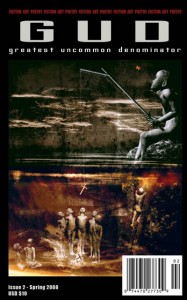
That said, I don’t think that all aspiring writers should necessarily start with short fiction, or use it as a testing ground. Writing an accomplished short story is quite different to writing an accomplished novel and, although there is obviously some overlap, the skill sets required are significantly different. Just because you get good at one form, it doesn’t mean you will be able to transfer your skills to the other. I know a number of authors who have only written novels (or only series/trilogies even), or else did not try their hand at short fiction until well into their career. So it’s not an automatic stepping stone, and short does not always mean easier, or easier to publish.
If you like the short form, enjoy writing within the confines of modest word counts, and have story ideas that suit, then go for it. But for some writers, the ideas are always going to be big and sprawling, and will never be able to pared down to 5,000 words, or even 20,000 words. And that’s fine as well. Marathonrunners aren’t likely to need to hone their sprinting skills, after all! Just write the stories that are inside you, in whatever form and length that they need to take, and write them as well as you can. Then rinse and repeat. Over and over again. That’s really the best advice I have for any aspiring writer.
Q: Your first novel, Madigan Mine, was published by Picador in 2010. (Gorgeous cover, by the way). Without giving too much away, the story is told from a male perspective about the love of his life who is also his nemesis. Was there ever any question in your mind that the narrative Point of View had to be male? And did you find it easy to slip into his view point?
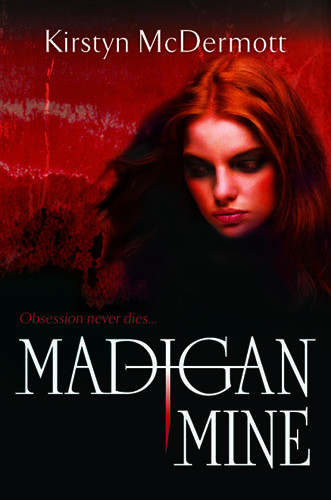
Even though Madigan was the character I found first, I always knew that her story needed to be told from the point of view of her lover. And, in this particular story, certain plot points required that lover to be male, so the gender choice was very easy and not one I ever veered away from. The hardest about writing Alex wasn’t the fact that he was male; it was that he was so damn passive. Trying to maintain pacing, suspense and interest in a character who, for greater part of the story, remained almost completely reactive proved to be the most challenging aspect of writing Madigan Mine.
To be honest, I don’t find writing from the male point of view all that arduous. I have been an avid reader my entire life, often in traditionally male-heavy genres such as Horror and Science Fiction, as well as Literary Fiction (a genre unto itself). Which means that I have spent the majority of my intellectual life immersed in the male voice and point of the view, the intricacies of the male subconscious, the particularities of male physicality, and so on, all presented with an innate assumption of male authorial authority. Which of course extends to the perception and representation of the female and the feminine.
So, personally, I find it easier to write from a male point of view because I have encountered so many diverse and nuanced cultural representations of men – or, at least, white western men. Such exposure gives me a better “feel” for a male character, where he might fit in the vast (male) cultural spectrum, where he falls short. Sadly, by contrast, I am often daunted and doubtful when writing the female point of view, because I feel I have less of a cultural sample set, to speak. The feminine is not as well charted, the ground less sure. Which is probably why I am far more interested in writing, and writing about, women these days. I like the challenge, and I like helping to build a more complex, richer and multi-faceted social construct of what “woman” and “girl” and “female” actually mean and how those concepts map to reality.
Q: In your 2012 Snapshot interview you said: ‘I did finally manage to finish what I have come to think of as My Difficult Second Novel, and am right about to start the edits on that. Its real name is Perfections and I don’t think I have ever hated writing anything so much as I hated writing that book for the longest, longest time.’ Having won an Aurealis Award and critical acclaim for your first book, Madigan Mine, you must have felt the pressure to top this success with your second novel. How did you come to terms with this and what can we expect from Perfections? (Is that title a Freudian slip, are you a perfectionist?)
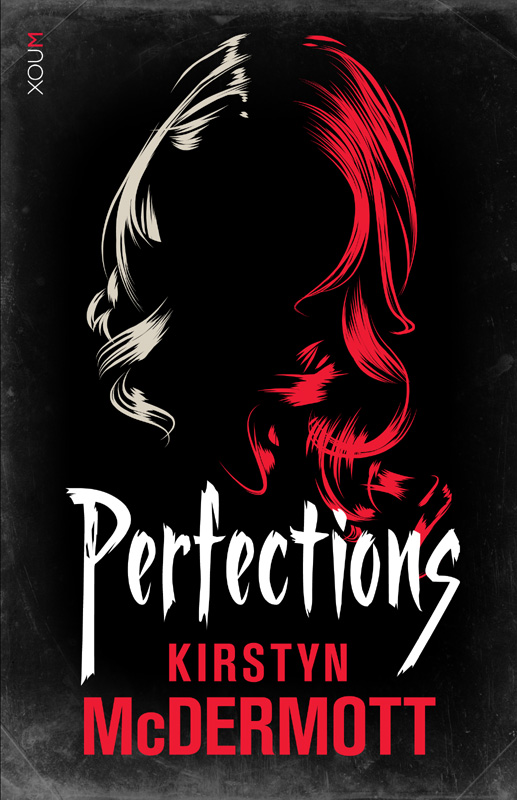 Why, yes, I am somewhat of a perfectionist, although the title refers to a different type of perfection that that. But you’ll have to read the novel to find out exactly what 🙂
Why, yes, I am somewhat of a perfectionist, although the title refers to a different type of perfection that that. But you’ll have to read the novel to find out exactly what 🙂
It wasn’t so much pressure to top Madigan Mine – for a long time, I just thought of that as my little first novel, which I’d gotten nicely out of the way before moving onto other things; it took a while for the fact that other people liked it, really liked it, to properly sink in. Also, like many perfectionist writers, I excel at dismissing the merit of my own work. Especially once it’s published.
The problem with Perfections was that it consistently refused to be the book I thought I was writing, and kept insisting on being this other book that I kept fighting against. That’s never going to end well, is it? Still, it took me a long, stubborn time to come to terms with the story as it needed to be told, as it deserved to be told, and trust that I was the writer to tell it. Perhaps, as it’s a narrative about two sisters, told equally from their points of view, my inherent doubts about successfully writing diverse female points of view became part of the problem. As was the notion, which I only unpacked and banished towards the very end of the writing, that the story was “too girlie” and “unimportant”. But it’s neither. It’s complex and layered and it happens to feature two women as the co-protagonists, with love and relationships as the central theme. All of which says something disturbing about the types of narratives that we choose to privilege and deem significant in our culture, and how these choices seep into our psyches no matter what.
That said, Perfections did turn out to be a lot darker and nastier than I originally thought it might, so it seems I was worried for no reason on that score. I still don’t know where the novel fits, genre wise, but I’m keen to see what people think of it. To me, it’s absolutely a Modern Urban Gothic, a descriptor with which a friend tagged my work some years ago, and one I’m happy to wear. I love the high stakes, high emotion, haunted and fraught narratives of Gothic fiction, as well as its capacity for subtext and symbolism. It’s a palette I don’t think I’ll ever tire of playing with.
Q: I understand you have a collection of short stories coming our through Twelfth Planet Press soon. Are these reprints or new stories? Have you written to the theme?
My collection is part of the Twelves Planets series, so the four stories will be all new and original works. They’re not explicitly interconnected as some of the collections, like Sue Isle’s, Tansy Rayner Roberts’ and Deb Biancotti’s, have been, but I consider them to be linked – or perhaps “harmonised” is a better word – by tone. I started out with the idea that I would write a collection of ghost stories, because I was on a bit of ghost story kick when I pitched the book to Alisa, but that didn’t quite come to pass. They’re all stories of haunted people, though, even it’s not a traditional “ghost” doing the haunting. It’s my Gothic side coming out again, I guess, but the symbolism inherent in haunted stories is something to which I find myself being constantly drawn, as both a writer and a reader.
Q: I read your commentary on Joss Whedon’s Cabin in the Woods and really enjoyed it. (I’ve seen all of Firefly, Serenity, Buffy and Dollhouse. Firefly, several times). Firefly was the most sophisticated of Joss’s series and the most ambitious, but the least commercially successful (yet it has a very strong following amongst the fans). While there is a growing sophistication in the audience, the mainstream TV and Movie makes seem to be going for Blander and Dumber. Do you find it hard to discover TV series and movies that are compelling and challenging? Have you seen The Fades, the UK version of Being Human? Can you recommend some interesting and challenging movie/TV series?
I started to watch The Fades after a couple of people recommended it to me, but I really couldn’t get into it at all. It seemed simplistic and overly reliant on convenient (but nonsensical) plotting and conventional character types. I much preferred the original UK version of Being Human (haven’t seen the US remake) and the UK series Misfits to The Fades – although I’m yet to watch the final seasons of either. I have slightly more patience for television shows than I do for books, mostly because I am usually multi-tasking something else while watching them. Movies, on the other hand, especially ones I’ve gone to the theatre to see, have a tremendous capacity to irritate me – Prometheus, Dark Knight Rises, I’m looking at you – again because of the time I’ve devoted to them. Time is my most precious commodity. I don’t have enough of it, and can never get any more of it, so if I feel it’s been wasted … grrrrr. If you’re wanting recommendations, two exceptional films I’ve seen this year have been Tinker Tailer Soldier Spy and the Fincher remake of The Girl with the Dragon Tattoo.
Unfortunately, a lot of the TV shows I begin watching, often with great enthusiasm, tend to go off the boil. Or else I just get tired of them. Long seasons and open-ended narrative arcs that go on forever require tremendous stamina on the part of both the producers and the audience, and rarely does that seem to pay off for me. I really liked Dexter to begin with, for example, as well as True Blood, Battlestar Galactica and Fringe (once I got through the problematic first season), but pretty much abandoned them all. I get bored easily I guess, and simply amping up the (often artificial) mystery and melodrama isn’t going to keep my attention. Personal taste plays a strong part in this, of course, as I don’t tend to read a lot of series or trilogies either. Whether they’re on the page or on the screen, I tend to prefer my stories discrete and self-contained; stories I can read/watch fairly quickly and then continue on to something new and often different. Hence my favourite TV shows are usually those with fewer episodes and/or seasons, or self-contained episodic or seasonal stories. Some I would recommend would be Black Mirror, Dead Set, Afterlife, Luther, American Horror Story, The Wire, and Treme. Oh, and Black Books for comic relief, of course. I manage to re-watch that at least once a year.
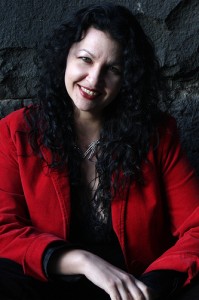 Q: I was prompted to start this series of interviews because there seems to be a perception in the US and the UK that fantasy is a bit of a boy’s club. Do you think there’s a difference in the way males and females write fantasy? The same could probably be said for horror. What is your take on this?
Q: I was prompted to start this series of interviews because there seems to be a perception in the US and the UK that fantasy is a bit of a boy’s club. Do you think there’s a difference in the way males and females write fantasy? The same could probably be said for horror. What is your take on this?
I do think there’s a difference in the way men and women write all sorts of things, fantasy and horror definitely included. This most likely comes down to gender socialisation and cultural issues, rather than biology, although it’s all interwoven to some extent. That’s not to say that it’s always, or even often, possible to pick the gender of an author from the works they have written, but generally speaking there are distinct differences. Of course, this is a self-fulfilling prophecy in many ways: in the types of writing publishers and readers expect from different genders; in the allowances and authority that will be granted to one gender over another depending on genre, theme, character, subject matter, etc; and in the ways that writers of different genders shape their own work, consciously or otherwise, to suit (or counter) such expectations.
It’s complicated, and problematic, and not an issue that’s likely to be resolved any time soon. And the fact that it needs to be resolved is salient in itself. If we were dealing with a simple observation or acknowledgement that men and women (let alone more fluid gender identities) write differently, then okay, fine, whatever. The greater problem is with the values and judgements that then become associated with the perception (valid or otherwise) of this difference. And the number of surveys, and studies, and statistical analyses that have been published recently do appear to support the argument that women writers, and genres in which women writers comprise the majority voice, are still considered lesser than their male counterparts. (And it’s much worse when it comes to matters of race and culture, let’s not forget that.)
The Horror genre undoubtedly has an image problem. Part of that is the large amount of bad – and badly written/produced – books and movies that focus on, shall we say, the more gratuitous and misanthropic, if not downright misogynistic, end of the genre. That’s not for everyone, granted, although there is some very fine work being done in these areas that tends to be overlooked among the chaff. But perhaps the real problem is a definitional one, and the narrowing effect that the genre is suffering right now. After all, if you decide that all the interesting, challenging, intelligent and well-written books are “too good” to be called Horror, and that Horror is merely a genre made of stories where women are raped, tortured or killed, then of course Horror is going to be maligned, derided and snubbed. And a lot of female writers are probably going to decide that such a genre is not for them, or at least that what they write isn’t Horror. QED.
Horror is a broad and slippery genre that gets its, ahem, tentacles into everything. It isn’t just tortureporn or splatterpunk, and never was; these are just two or many subgenres that Horror has the capacity to contain if it is allowed to. It’s written by men and it’s written by women, and it’s a stronger, more nuanced genre for it. After all, a significant portion of what human beings find horrific, terrifying or dread-inspiring, is gender specific. We need all these stories, and we need to acknowledge them as Horror – no matter which subgenre they inhabit along the way. A little more racial/cultural diversity wouldn’t hurt either, not-so-quietly speaking.
Q: Following on from that, does the gender of the writer change your expectations when you pick up their book?
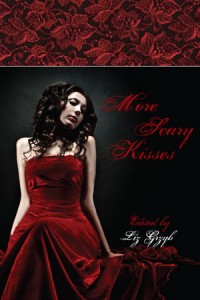 It almost certainly does, and probably in ways of which I’m not entirely conscious, especially when it’s an author I’m unfamiliar with. Specifically, I know I generally feel like I’ll have a better time with female characters in a book if it’s been written by a woman. Of course, this isn’t always the case and women are more than capable of writing awful, stereotypical, angry-making representations of their own gender. But the expectation is there, to be fulfilled or otherwise depending on the quality of the book.
It almost certainly does, and probably in ways of which I’m not entirely conscious, especially when it’s an author I’m unfamiliar with. Specifically, I know I generally feel like I’ll have a better time with female characters in a book if it’s been written by a woman. Of course, this isn’t always the case and women are more than capable of writing awful, stereotypical, angry-making representations of their own gender. But the expectation is there, to be fulfilled or otherwise depending on the quality of the book.
I’m sure there are many more unacknowledged expectations I have in regards to the author’s gender, but other preconceptions are often more prominent in my mind. What genre it falls into, what I’ve been told about it in advance – it’s very rare for me to pick up a book completely on spec these days – and even why I’ve decided to read it in the first place, which might actually include the author’s gender as a motivating factor.
Actually, there’s one more very specific thing of which I’ve become keenly aware – with a first person narrative, especially if it’s a short story in an anthology, these days I will tend to automatically gender the narrator in line with the author. It’s an improvement of sorts from when I was in my teens and twenties and would find myself automatically defaulting male in any first person narrative – a by product of my heavily male-oriented literary diet back then, no doubt. But it’s interesting, if a little depressing, to find that assigning gender to a character straight out of the gate is still something that my mind obviously demands. Then again, English is a highly gendered language, as is our culture, and gender often is the first marker we seek in our interactions with each other. We really, really need a good quality set of gender neutral pronouns, don’t we?
Q: And here’s the fun question. If you could book a trip on a time machine, where and when would you go, and why?
I’m going to sound a little boring here, but I honestly wouldn’t book any kind of trip in a time machine. It’s far too dangerous to go into the past and accidentally mess things up, and I don’t think I really want to know exactly what the future holds. It’s more fun to find out the old fashioned way, by living through it.
Unless, wait … how about I keep my free ticket on hand for those awful times when you say or do something you immediately wish you could undo. Like having a “restore saved game” function for real life. That’d be neat. But, again, I’d have to use it as soon as I wanted to reset something or else, you know, that whole messing with the past thing. I’ve read the books, and seen the movies. That never ends well!
Look out for Kirstyn’s new book Perfections .
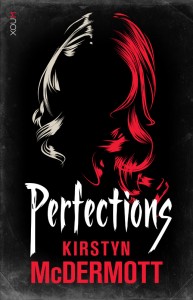
Catch up with Kirstyn and Ian’s Podcasts here
Catch up with Kirstyn on GoodReads
Catch up at Kirstyn’s blog
Catch up with Kirstyn on Twitter @fearofemeralds
